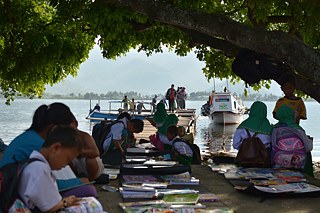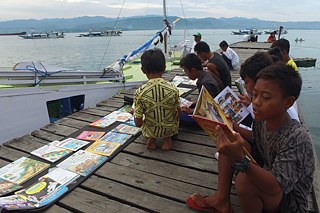Mobile Libraries
Mobile Libraries in the Furthest Corners of Indonesia
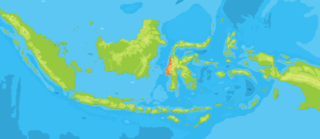
Most public libraries in Indonesia aren’t mobile libraries, but are housed in buildings. However, this kind of library only has a limited reach due to Indonesia’s geographical location and the fact that the country consists of thousands of islands. Moreover, not all Indonesians feel comfortable visiting a public library in a building. Mobile Libraries are an effort to reach out to more people, specifically to communities in regions with limited access to transportation and information.
During the literature festival in Makassar – the Makassar International Writers Festival (MIWF) 2017, at a discussion titled “Books and Activism”, Nirwan Ahmad Arsuka spoke about his activities all across Indonesia – Sulawasi, Nusa Tenggara, Kalimantan, Sumatra, Moluccas, Papua and Java – over the past four years to meet and encourage people to become involved in the Mobile Library. The Mobile Library is a network of volunteering citizens, who work to support the independence of local communities by distributing free books, specifically in areas with limited access to transportation and without any public library.
Nirwan believes that Indonesian children are actually not lacking an interest in reading, but that the limited access to books makes it hard to reach them. Even if they do have access, the available books are not of interest to children - this became clear when he traveled on horseback to remote regions and brought several children’s books with him which he then read to the kids - only then he could see that they were enthusiastic.
Currently, Mobile Library Indonesia already has a network in several regions; including the Boat Library, the Library on Horseback, the Cart Library, the Train Library, the Pedicab Library, the Ojek (Motorbike) Library, the Motorcycle Library, the Rickshaw Library, the Backpack Library, the Bicycle Library, the Noken (woven bag) Library. In some places, the books are brought on foot, like the Bois Library in Banggai Laut, Central Sulawesi, and in West Papua, where a young girl treks up the hills and crosses rivers carrying the books.
“The Mobile Library tries to encourage the people to build their own reading and writing culture, so that they can write down their own history and stories and at the same time form a continuing social, political and cultural reality,” Nirwan explained.
Noken Library - Presenting Knowledge in a Noken
25-year-old Agus Mandowen is a young weightlifting athlete who volunteers for the Noken Library. He walks from village to village, carrying books in a noken (woven bag). The Noken Library belongs to the network of the Mobile Library in Manokwari, West Papua.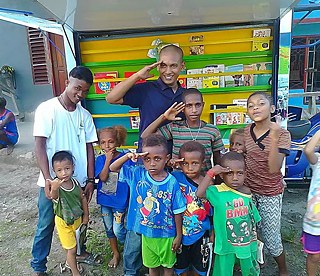
“Noken is a special way to bring books to the people of Papua, as they are familiar with it, be it children or mothers. When I used the Noken, I myself felt like I was a Papuan. It would have been different if I had brought the books in a plastic bag because there is no cultural connection to it. The people may as well have thought that I come to sell ice cream,” said 29-year-old Anand Yunanto, a Javanese who has been living in Papua for five years. Anand uses Noken but doesn’t go on foot. Instead, he drives a three-wheeled motorbike across the districts in West Papua. According to Anand, the Noken Library currently has several “fleets” using different means of transportation; motorbikes, horses and boats. There is also a reading booth in every district of Manokwari. Currently, there are around 20 volunteers working for the Noken Library.
Anand says that it is a lot of fun to be a volunteer for the Noken Library. When he arrives at one of the villages, the children greet him by shouting “the teacher is here, the teacher is coming!”, although he is not a teacher, but a private employee. Another thing that makes him happy is that every time he leaves after visiting a village, there is always someone who gives him sweet yams, fish or gasoline for his motorbike.
Bois Library - Carrying Books in a Rattan Basket
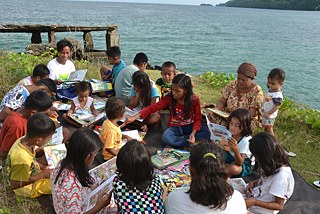
Banggai Laut is one of the districts that doesn’t have a library or a book store. The villages are scattered on the islands across the district. In order to buy food, go to the bank or reach a hospital and government offices, the villagers have to travel by sea on wooden boats to the next town. Some villages are three hours away, others even six to eight hours by boat
56-year-old Mardia Abdul Karim is a farmer from the village of Lipulalongo, located on the islands of Labobo in Banggai Laut. She also works as a volunteer for the Bois Library and runs the reading house Bulantul. Bulantul is derived from the language of the Banggai tribe and means “dolphin”. Mardia carries the books in a bois, going on foot from village to village. Often, she visits the villages’ docks because that is where the children usually play. At other times, she brings the books in the backyards of the villagers’ homes.
“I am actually not a well-educated person, I only graduated from elementary school. At my old age, I just would like to be useful to my neighbors in the village by sharing reading materials and books with them. I am going to carry these books to anyone who is willing to let me use their backyards or a corner of their house,” she said
Perahu Pustaka - Sailing With Books
While in West Papua there are Noken and in Banggai Laut, Central Sulawesi there are Bois for carrying books, in Mandar, West Sulawesi, there are three Boat Libraries that sail from one place to another delivering books. Each boat has a different name. The first Boat Library, which was established in 2015, is called Pattingaloang[1]. Currently, there are three different Boat Libraries; Pattingaloang, MembacaKu and Colliq Pujie[2]Ridwan Almuddin is the driver of the Boat Library in West Sulawesi. He is a writer, a maritime culture researcher, as well as an artist and videographer. According to Ridwan, to use a boat within a literary movement carries a symbolic role and maintains the maritime heritage of the ancestors.
“Of course, when you think about it, using a boat comes with a lot of operational costs. For instance, it costs 5 million Rupiah (ca. 320 Euro) to operate a boat for one week, while the people are thinking twice about buying a book. But we look further than that, because to us, the Boat Library is a symbol that the literary movement in the archipelago is strong; that the people living on small islands also have to be taken into account; that volunteers with different backgrounds who sail with us experience firsthand what it feels like to live on a boat. The boats that are used as Boat Library are traditional sailing boats. It is also a form of revitalization of our past technology that is still relevant until today - because if we sail, we practice the heritage of our ancestors,” Ridwan explained.
Currently, the Boat Library has a collection of around 8000 books that have been donated by private citizens and government institutions throughout Indonesia.
[1] Karaeng Pattingaloang, prime minister of the Gowa-Tallo kingdom in Makassar in the 17th century. Pattingaloang was a skilled scientist with knowledge of Western science and was fluent in different languages; Latin, Greek, Italian, German, French, Dutch, Portuguese and Arabic..
[2] Colliq Pujié Arung Pancana Toa—a noble Bugis scholar who possessed a profound knowledge on languages and literature. He was the one who translated the “I Lagaligo”, an epic longer than the Mahabrata. Colliq Pujié collected the stories of La Galigo for Dutch researcher Dr. B.F. Mathhes in 1852.
